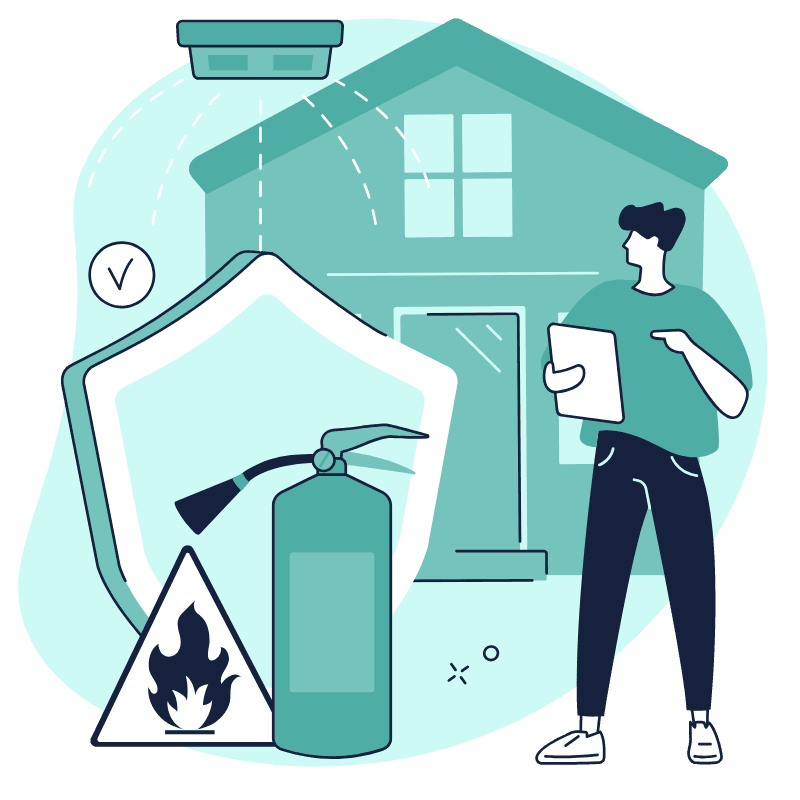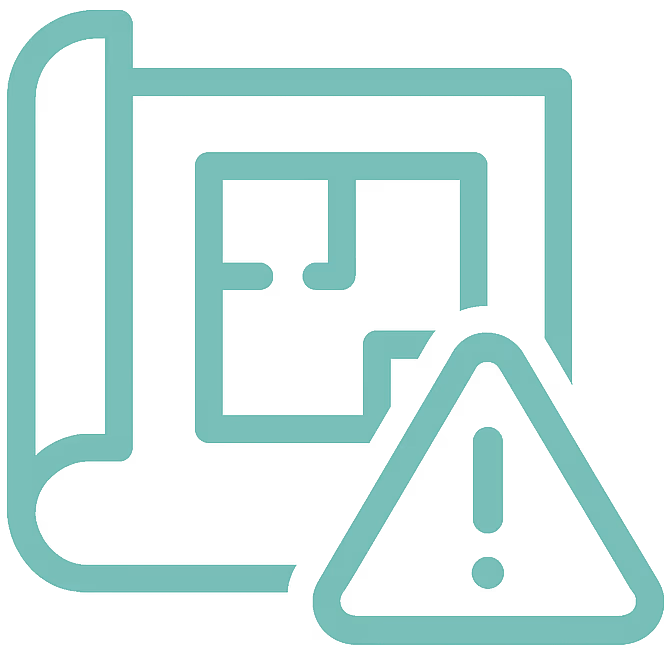Building Compliance for Residential Properties: A Comprehensive Guide


Ensuring a residential building meets all compliance obligations is a fundamental duty for freeholders and, in many cases, leaseholders. Building compliance encompasses the full spectrum of legal requirements that keep a property safe, habitable, and fit for occupation. These duties range from adhering to construction standards and fire safety laws to maintaining healthy living conditions over the building’s life. Failure to comply can result in severe consequences – from hefty fines (often tens of thousands of pounds per offence ) and legal action, to devalued property and lost trust. In fact, 78% of prospective buyers/leaseholders would avoid properties with known fire-safety issues, according to industry research . In short, non-compliance puts residents at risk and can significantly impact your investment. This guide outlines all key areas of residential building compliance in the UK, explains why they matter, and how you can meet these obligations (with a little help from technology and expert support) to protect both your occupants and your asset.
What Is Building Compliance?
Building compliance means meeting all statutory requirements in the design, construction, and ongoing operation of a building to ensure it is safe and legal. In practice, this starts with complying with the national Building Regulations whenever construction work or alterations are done. Building Regulations set minimum standards for structural integrity, fire safety, accessibility, energy efficiency, and more . These rules (in England and Wales, and equivalent building standards in Scotland and Northern Ireland) exist to make sure that buildings are structurally sound and do not pose health or safety risks . Importantly, compliance isn’t only a concern during construction – it continues through the building’s occupation, covering things like fire precautions, ongoing maintenance, and health and safety measures in communal areas.
In the UK, any significant building work (from new developments to extensions or material alterations) must be carried out to current Building Regulations. This typically involves submitting plans for approval and undergoing inspections by a Building Control body. Compliance is confirmed by obtaining a Building Regulations completion certificate or similar sign-off from the local authority or an approved inspector. This proof of compliance is often required when selling, letting, insuring, or refinancing a property , making it crucial documentation for property owners. We cover Building Regulations here.


Fire Safety Compliance
Maintaining robust fire safety in residential buildings is another core aspect of compliance – one that has been sharply in focus since the Grenfell Tower tragedy. In the UK (England and Wales), the Regulatory Reform (Fire Safety) Order 2005 applies to the common parts of multi-occupied residential buildings (such as apartment blocks). This law designates a “Responsible Person” – usually the freeholder, landlord, or managing agent in control of the premises – who must take reasonable fire precautions to ensure the building is safe . In practice, this means the Responsible Person must conduct and regularly review a Fire Risk Assessment (FRA) of all shared areas (entrances, corridors, stairwells, plant rooms, etc.) and act on its findings . The FRA evaluates risks to people from fire and identifies measures needed to mitigate those risks (for example, installing self-closing fire doors, emergency lighting, smoke alarms, fire extinguishers, clear escape routes, signage, and so forth) .
Under fire safety regulations, you must keep the risk assessment up to date – reviewing it regularly (typically annually, or more frequently if the building’s risk factors change) . Any significant changes to the building (like alterations, a new alarm system, or changes in occupancy) would prompt an updated FRA. The law is enforced by local Fire and Rescue Authorities, who can inspect the building and issue enforcement or prohibition notices if they find non-compliance . Recent updates to fire safety law via the Fire Safety Act 2021 have expanded the scope of what must be covered in the FRA – notably, the structure and external walls (cladding, balconies) and flat entrance doors of multi-family buildings are now explicitly included in the fire risk assessment . This was to ensure that issues like combustible cladding are not overlooked in light of past failures.
High-rise Residential Buildings
For high-rise residential buildings, additional fire safety measures are mandated by the Fire Safety (England) Regulations 2022 (in force since early 2023). These include things like installing secure information boxes on site with building plans and key contacts for fire services, wayfinding signage for firefighter orientation, routine checks of fire doors (monthly for communal doors, quarterly for flat entrance doors), and in buildings over 18m, providing information on external wall construction to your local fire service. Freeholders of such buildings need to be aware of these extra duties as part of their compliance program.


Consequences of Fire Safety Non-Compliance
Consequences of fire safety non-compliance are extremely severe. If you breach the Fire Safety Order, you could face unlimited fines or even imprisonment in the worst cases . (Recent government measures post-Grenfell have indeed strengthened penalties, allowing limitless fines for those who obstruct inspectors or fail to comply with fire regulations .) On a less quantifiable level, failing to implement proper fire precautions endangers lives – a risk no responsible freeholder can afford to take. It’s also worth noting the reputational and financial damage: buildings known to have fire safety deficiencies may become difficult to sell or insure, and residents may withhold rent or take legal action if they feel their home is unsafe.
Key fire safety compliance actions for residential buildings include:

Performing Fire Risk Assessments (FRAs)
Have a competent fire safety assessor evaluate all common areas and building features for fire hazards. Document the assessment and keep it updated .

Implementing Fire Precautions
Based on the FRA findings, ensure suitable alarms and detectors are installed, emergency lighting is in place, extinguishers or sprinklers (if required) are provided, and that escape routes (corridors, stairwells) are kept clear and well-lit. Fire doors should be fitted to flats and riser cupboards, with self-closing devices maintained.

Training and Information
For blocks with staff (concierge, maintenance teams) or where residents need guidance, provide basic fire safety training or instruction. Display fire action notices and ensure residents know what to do in an emergency.

Regular Testing and Maintenance
It’s not enough to install safety equipment – you must also service and test it on schedule. This means weekly fire alarm tests, monthly emergency light tests, annual alarm and extinguisher servicing, etc., typically via qualified contractors.

Record-Keeping
Keep thorough records of all fire safety checks, maintenance, training, and drills. The 2022 updates to the law require Responsible Persons to record their full fire risk assessment (not just significant findings) and keep records of fire-safety arrangements and the people who carried them out . In multi-occupied buildings, you also need to share fire safety information with residents, e.g. provide instructions on fire doors and evacuation procedures.
By diligently following fire safety regulations, freeholders not only avoid penalties but literally save lives and protect their property’s long-term value. With the heightened scrutiny on fire safety in recent years, it’s wise to get professional support if you’re unsure about compliance. For example, Yuno’s platform can help track your fire safety tasks – like reminding you of FRA renewal dates or maintenance schedules – and even connect you with accredited fire safety assessors to conduct inspections . Proactive management of fire risk is not just a legal checkbox; it’s a moral and financial imperative for anyone in charge of a residential building.
Building Safety Act 2022 and High-Rise Buildings
In response to systemic safety failings in high-rise residential blocks, the UK introduced the Building Safety Act 2022 (BSA) – a landmark law that overhauls how safety is regulated in taller buildings. If you are a freeholder or managing agent of a “higher-risk residential building” (HRB) in England, this Act brings new obligations you must comply with. A higher-risk building is defined as any residential building that is at least 18 metres (or 7 storeys) high and contains 2 or more residential units . This generally captures high-rise apartment blocks. The Building Safety Act establishes a dedicated Building Safety Regulator (BSR) under the Health & Safety Executive, and requires that all HRBs be registered with the BSR by the building’s dutyholders . (Indeed, existing high-rises had to be registered by October 2023, and new builds must be registered before occupation.)
One of the central concepts in the Act is the “Accountable Person” (AP). This is the entity (or person) responsible for managing fire and structural safety risks when the building is occupied . In many cases the AP will be the building’s freeholder or superior landlord – basically whoever owns or has the obligation to repair the common parts of the building . If multiple parties share ownership/maintenance, the Act designates a single Principal Accountable Person (PAP) (often the freeholder) who has ultimate responsibility . The key point is that the duty for keeping the building safe during occupation now falls squarely on those in control of it. The Accountable Person cannot delegate their legal obligations – even if they hire managing agents or contractors, the AP retains liability for ensuring safety measures are carried out .

What must Accountable Persons do under the BSA?
In broad terms, they must assess and actively manage the risks of fire spread and structural failure in their building . Concretely, this involves a number of new duties and systems, including:

Building Safety Case and Risk Assessments
The AP must conduct detailed safety risk assessments for the building’s structure and fire systems, taking into account how a fire could start and spread, or how structural defects could cause collapse. They need to identify hazards and take all reasonable steps to prevent them or reduce their severity . These assessments form part of a Safety Case Report which may need to be submitted to the regulator.

Golden Thread of Information
The AP must keep certain key information about the building’s design and ongoing safety management – known as the “golden thread” – in a secure and accessible form . This includes up-to-date building plans, materials data (especially for external walls), fire protection systems info, maintenance and inspection records, etc. The idea is that any new person taking over the building’s management, or any official, can quickly get a full understanding of the building’s safety status from this documentation.

Resident Engagement and Complaints
The Act requires involving residents in safety. APs must create a Resident Engagement Strategy, informing residents about building safety measures and how they can report issues . There are provisions for residents to raise safety concerns and for these to be addressed. Good communication and transparency with leaseholders/tenants is now part of compliance.

Ongoing Inspections and Maintenance
Similar to an enhanced FRA, the AP will conduct periodic inspections (e.g. of flat entrance doors, structural elements, fire systems) and take necessary maintenance actions to keep the building safe. Certain occurrences (like a fire incident or a structural crack discovery) must be reported to the BSR under mandatory occurrence reporting .

Building Safety Certificate
Once the new regime is fully in force, higher-risk buildings will require a Building Assessment Certificate from the regulator, which is only given if the AP can demonstrate they are effectively managing the building’s safety risks. This is somewhat analogous to a license to operate the building safely.
The Building Safety Regulator has powers to enforce these duties. If an Accountable Person fails to register a higher-risk building or doesn’t comply with an enforcement notice to rectify safety issues, they can face criminal charges (including fines or imprisonment). The new regulator can also charge fees to dutyholders for its oversight activity. The overarching goal is to instill a proactive safety culture, so that issues are addressed before they lead to disasters.
What It Means for Smaller vs. Higher-Risk Buildings
For buildings that aren’t tall enough to be “higher-risk buildings,” the Building Safety Act still brings some changes (for example, a new construction products regulator and changes to the Defective Premises Act liability extending to 15 years retrospective). But the day-to-day compliance focus for smaller buildings will remain on the other areas (fire, health and safety, etc.) discussed in this guide. If you do own or manage a high-rise residential building, however, complying with the BSA is now a top priority alongside traditional fire safety. You may need to appoint or train a Building Safety Manager (though the formal role was made optional) and ensure you have robust systems in place for monitoring structural and fire integrity. Given the complexity of these new requirements, many freeholders are turning to specialist consultants and software to help manage the load . The takeaway: building safety compliance is now an ongoing, regulatory-supervised process – not a one-off check – for high-rises. By embracing these responsibilities, you protect your residents and stay ahead of legal risks.

Other Key Compliance Requirements for Freeholders
Beyond the headline items of building structure and fire, residential freeholders and landlords must juggle several other compliance obligations to keep their properties safe and legal. These often fall under health, safety, and environmental regulations. Here are the major areas to be aware of:
If the property has any gas appliances (e.g. boilers, cookers) in tenanted areas, landlords are legally required to perform annual gas safety checks. A Gas Safe registered engineer must inspect all gas installations and flues every 12 months, and provide a Gas Safety Certificate (CP12) . Copies of the certificate must be given to tenants. Even in blocks where gas is only in communal boilers or plant, the freeholder should ensure those systems are safely maintained and checked. Gas safety is critical – faulty gas appliances can lead to carbon monoxide poisoning or explosions. Non-compliance can lead to fines and criminal charges, so never skip the yearly gas inspection.
In England, landlords must have the electrical installations in rental properties inspected at least once every 5 years by a qualified electrician. This periodic inspection results in an Electrical Installation Condition Report (EICR) that identifies any unsafe wiring or equipment. Any Category 1 (danger present) hazard must be fixed immediately, and other issues within 28 days. Landlords are obligated to provide tenants and the council with copies of the EICR. This requirement became law in 2020 to improve electrical safety in private rentals . Even outside of England or in owner-occupied blocks, it’s wise to regularly check communal electrical systems (like emergency lighting circuits, lift machinery electrics, etc.) for safety. Electrical fires are a common risk, so compliance here helps prevent one major source of danger.
If your residential building was built before the year 2000, there is a good chance that some building materials (like insulation, floor tiles, textured coatings) contain asbestos. As long as asbestos is in good condition and undisturbed, it poses minimal risk; but if damaged or drilled, it releases harmful fibers. U.K. law (Control of Asbestos Regulations 2012) imposes a duty to “manage” asbestos in non-domestic premises, and this explicitly includes the common areas of residential flats (e.g. lobbies, corridors, lift shafts, roof spaces) . The freeholder or managing agent must have an asbestos survey conducted to identify any asbestos-containing materials in those common parts . If asbestos is present, you are required to assess its condition and risks, and develop a management plan . That plan might simply be to periodically monitor the material if it’s in good shape (labeling it and ensuring no one disturbs it), or, if it’s deteriorating or will be affected by refurbishment work, to have it safely removed by licensed professionals. All staff/trades working on the building should be informed of any asbestos locations. Failure to manage asbestos can lead to HSE enforcement. Moreover, at the point of flat sales, solicitors will often ask for evidence that an asbestos risk assessment has been done for the building , so compliance here also smooths property transactions.
Landlords and building managers have a duty of care to prevent exposure to Legionella bacteria, which can breed in stagnant or lukewarm water systems and cause Legionnaires’ Disease (a type of pneumonia). Health and safety law doesn’t mandate a specific certificate, but it does require a risk assessment for Legionella and appropriate control measures . In practice, for a typical small block of flats, the risk is low – regular water usage and proper temperature control usually suffice. However, you should assess your water system (tanks, pipes, air conditioning cooling towers if any) to identify any risk areas (for example, an unused rooftop water tank or infrequently used outlets). Simple measures include flushing through little-used taps and showers, keeping hot water hot (≥60°C) and cold water cold (≤20°C), and ensuring shower heads are cleaned of scale. Documentation of a legionella risk assessment is advisable, and landlords can be prosecuted for failing to manage this risk even if no one falls ill . In more complex residential settings like sheltered housing or blocks with pools/spas, professional legionella control services may be needed. But even for an average rental property, remember that legionella compliance is legally expected as part of general H&S duties.
If your building has a passenger lift, you must adhere to the Lifting Operations and Lifting Equipment Regulations (LOLER) and the Provision and Use of Work Equipment Regulations (PUWER). These require that lifts used by people are thoroughly examined by a competent engineer every 6 months (and lifts for goods annually) . This biannual inspection is in addition to regular servicing. After each thorough exam, you’ll receive a report identifying any defects; serious defects must be addressed immediately. Similar obligations apply to other safety-critical equipment – for example, any pressure vessels (boiler pressure systems) or smoke ventilation systems may require periodic inspection under specific standards. Keeping up with these inspections not only keeps the equipment safe but is usually also a condition of insurance. If a lift is not properly maintained and certified, it can be shut down by authorities, and an accident due to negligence could have severe legal ramifications.
Freeholders or landlords of rented residential properties must ensure they are free of “category 1 hazards” under the Housing Health and Safety Rating System. This system, enforced by local councils under the Housing Act 2004, covers 29 categories of potential hazards in dwellings – from damp and mold, excess cold/heat, to fall risks, fire, sanitation issues, pests, etc. . If a tenant complains or the council inspects and finds serious hazards, the council can serve an Improvement Notice requiring you to fix the issue, or even a Prohibition Order barring use of part or all of the property . Civil penalties for HHSRS breaches can reach £30,000 for serious cases, and tenants can potentially claim back rent via Rent Repayment Orders if a property is found unfit . What this means for compliance: keep your property well-maintained. Address repairs (roof leaks, broken balustrades, faulty wiring, vermin infestations, etc.) promptly to avoid hazards. Ensure adequate heating and insulation to prevent extreme cold. Provide sufficient fire precautions (smoke alarms, escapes) as required by regulations. Many HHSRS obligations overlap with the specific duties we’ve discussed (fire, gas, electrical, etc.), but it essentially broadens the view to general habitability and safety. The best strategy is to schedule regular property inspections to catch issues early. Yuno even offers HHSRS assessment services to help landlords identify and remediate hazards proactively .
Under the energy efficiency regulations, any self-contained dwelling needs an Energy Performance Certificate (EPC) when being sold or rented out. The EPC rates a home’s energy efficiency (A to G). Since 2018, it has been unlawful to let out a property in England and Wales with an EPC rating below E (with some exceptions), under the Minimum Energy Efficiency Standards (MEES). If your building or flats are rated F or G, you must undertake improvements (insulation, better heating, etc.) to raise the rating to at least E before granting a new tenancy (or renewals), or face enforcement and fines. The government is considering raising this minimum to a C rating in the coming years as part of climate policy, which would vastly increase the requirements on older properties. Compliance steps now include getting a valid EPC every 10 years and planning upgrades to meet current and future standards . Freeholders should also be conscious of communal energy features – for instance, communal lighting on inefficient bulbs or an old central boiler could be areas to improve. Aside from legal compliance, energy-efficient buildings are more attractive to buyers and tenants (and cheaper to run!), so there’s an incentive to go beyond the minimum. Yuno’s platform can help track **EPC expiry dates and advise on cost-effective energy upgrades to ensure you meet legal standards.
Finally, don’t overlook any local licensing requirements that may apply to your building. In many parts of the UK, if you rent out a house or flat to multiple occupants, you might need an HMO (House in Multiple Occupation) license or other rental license. For example, mandatory HMO licensing is required if your rental property houses 5 or more unrelated people forming more than one household (common in shared houses or certain flat conversions). Some local councils also have additional HMO licensing for smaller HMOs or selective licensing schemes that require all landlords in a certain area to get a license. If you’re a freeholder managing an entire building of flats that are rented out, check if an s.257 HMO license is needed – this applies to certain buildings converted into self-contained flats that do not meet 1991 Building Regulations standards and where less than two-thirds of flats are owner-occupied . Importantly, obtaining such licenses is part of compliance: operating an HMO without the required license is a criminal offence, with penalties including fines up to £30,000 and rent repayment orders. Licensing schemes also impose their own conditions (e.g. providing specific fire precautions, minimum room sizes, amenity standards, and good property management). So, ensure you check the rules in your local authority and secure any needed licenses for your building. Yuno specialises in navigating property licensing and can quickly tell you what licenses (if any) your property needs, and even handle the application process for you.
As one can see, residential building compliance is truly multi-faceted. A diligent freeholder or landlord needs to wear many hats: fire marshal, health & safety officer, building surveyor, energy consultant, and administrator – or have a reliable team (and tools) to cover these bases. It’s a lot to manage, but the cost of neglecting any one of these areas can be enormous, both financially and in terms of human safety. The silver lining is that by staying on top of compliance, you protect your tenants, avoid legal troubles, preserve your property’s value, and sleep easier at night knowing you’ve met your obligations.
Why Compliance Matters (Fines, Liability and Reputation)
If the above sections make one thing clear, it’s that compliance is not optional. The UK’s property laws have teeth, and failing to comply can hurt you in more ways than one. Let’s summarise why building compliance is so critical – not just to satisfy regulators, but for the sake of your investment and everyone involved:
Authorities can and do levy significant penalties on non-compliant landlords and freeholders. Under the Housing Act 2004 and other laws, financial penalties up to £30,000 per offence are possible for breaches like renting out an unsafe home or missing a required license . For the gravest offences (e.g. fire safety breaches leading to risk of death), fines are unlimited and prison sentences (up to 2 years or more) can be handed down . Non-compliance can also lead to Rent Repayment Orders, where landlords must return months of rent to tenants. In short, ignoring compliance can swiftly become more expensive than the cost of doing things right.
Beyond regulatory fines, if neglecting your duties leads to an accident – say a tenant is injured by a hazard you failed to fix, or a fire spreads due to lack of proper precautions – you could be held liable in civil lawsuits. Victims (or their families) may sue for damages, and insurance might not cover you if you’ve been negligent or broken the law. Many insurance policies have conditions requiring compliance with fire regulations, gas servicing, etc., as a precondition for coverage. So non-compliance might void your insurance, leaving you personally exposed to huge losses. From a risk management perspective, compliance is your first line of defense against costly litigation and insurance nightmares.
Properties with compliance issues tend to plummet in value or become hard to sell. As noted earlier, a vast majority of buyers are now wary of buildings with unresolved fire safety problems . We’ve seen this play out in the cladding crisis: flats in high-risk buildings became virtually unsellable until remedial works and paperwork were sorted. Even on smaller scales, savvy buyers will ask for certificates (Building Regs approval, FRA, asbestos survey, etc.) during due diligence. If you lack these, it undermines buyer confidence and can derail sales or force price reductions. Lenders, too, are hesitant to lend on non-compliant properties – mortgage valuers will flag missing fire risk assessments or suspected hazards, and banks may refuse loans until issues are fixed. Thus, compliance protects your asset value. It keeps your pool of potential buyers and tenants wide, whereas a known compliance problem (like an illegal extension or an unlicensed HMO) will shrink your market and invite discounted offers or regulatory intervention.
For landlords running rental portfolios, compliance failures can directly cut into income. Councils can issue Banning Orders barring landlords from letting properties in serious cases. They can also impose management orders taking over the running of a building (collecting rent themselves) if they deem the landlord unfit. Even more commonly, tenants today are aware of their rights – a tenant could refuse to pay rent, citing disrepair or hazards, and might win in court if the property truly is unsafe. With mechanisms like rent repayment orders, a non-compliant landlord might have to pay back up to 12 months of rent to each tenant for certain offences. It’s simply good business to stay compliant: you avoid interruptions to your rental income and maintain a good reputation, which attracts and retains good tenants.
At the heart of all these laws is one simple outcome: keeping people safe and healthy in their homes. As a freeholder or landlord, you are providing more than just a building – you’re responsible for a living environment for real human beings. Neglecting fire safety or structural maintenance can have catastrophic, irreversible consequences. While the legal and financial motivations are significant, the moral obligation should be too. No one wants to be the cause of a preventable tragedy. By diligently managing compliance, you uphold your duty of care, ensure your residents sleep safely at night, and contribute to a culture where housing is safe for all. This, in turn, fosters goodwill and trust – compliant landlords tend to have better relationships with tenants and less conflict.
In summary, compliance matters for every conceivable reason: it keeps you on the right side of the law, shields your wealth, preserves your property’s desirability, and protects lives. Conversely, non-compliance is a lose-lose proposition – you risk legal punishment, financial loss, and harm to people and reputation . The landscape of regulations may seem burdensome, but it’s aimed at these very outcomes. Fortunately, by taking advantage of modern compliance tools and expert advice, staying compliant is far more achievable today than it once was. It’s an investment in peace of mind, for you and everyone who lives in or visits your building.
How Yuno Can Help Simplify Compliance
Yuno’s compliance platform provides a one-stop solution to manage all these obligations seamlessly. The screenshot above illustrates how a freeholder or property manager can view at a glance the status of various compliance areas – from fire risk assessments and Building Safety Act requirements to energy certificates – all in a central dashboard. Yuno automatically tracks upcoming deadlines (for example, an expiring gas safety certificate or an overdue FRA) and sends timely reminders so that nothing falls through the cracks . With everything clearly laid out and updated in real time, you can proactively address issues and avoid the last-minute scrambles or oversights that often lead to non-compliance.
Yuno is not just software; it’s a complete compliance support system. As the UK’s leading end-to-end property compliance platform, Yuno combines expert guidance with automation to take the stress out of compliance management. In practice, this means when you use Yuno, you’re tapping into a team that stays on top of ever-changing regulations and a technology that streamlines your workflows. Yuno’s solution covers every aspect of residential property compliance: licensing and planning checks, building safety monitoring, fire safety management, scheduling of gas/electrical checks, energy efficiency upgrades, and more . The platform will alert you to new legal changes (for instance, if a council introduces a new landlord licensing scheme or if MEES energy standards are tightened) and explain what it means for your properties. In other words, Yuno helps you navigate complex rules without the hassle of manual research and tracking.

Some key benefits of Yuno’s compliance platform and services include:

Automated Tracking & Reminders
Yuno eliminates manual tracking by automatically logging all your compliance requirements and their renewal dates . You get notifications well in advance of deadlines – whether it’s to book the next elevator inspection or renew an HMO license – ensuring you never miss a legal deadline . This reduces human error and the risk of costly oversights.

Document Management
All your compliance documents (certificates, reports, permits) can be stored securely in Yuno’s cloud system . Need to retrieve the latest EICR or show an inspector your fire alarm service record? It’s all organized and available at your fingertips, even across large portfolios. No more digging through filing cabinets or old emails – compliance records are accessible on demand.

Expert Support and Guidance
One thing that sets Yuno apart is that it’s not just tech doing it all – property compliance experts are available to help you interpret requirements and even arrange the physical services you need. For example, if your FRA comes due, Yuno can connect you with a vetted fire risk assessor; if your building needs an asbestos survey or a complex Building Safety Act safety case, Yuno’s expert network can step in . Essentially, Yuno is like having a compliance consultant on call, guiding you through from initial assessment to issue resolution . This is invaluable when you’re unsure how to tackle a requirement or solve an issue – you’re not left alone to figure it out.

Comprehensive Coverage (Simple to Complex)
Whether you just have one rental house or a nationwide portfolio of apartment blocks, Yuno scales to your needs. It handles the simple compliance tasks (like scheduling gas checks, EPC renewals – the bread-and-butter items) as well as complex compliance areas that many general property managers struggle with . For instance, Yuno stays on top of Building Safety Act obligations for high-rises, helps you coordinate HMO license applications, and monitors local planning Article 4 directions or selective licensing zones that might affect you . By consolidating all this, Yuno ensures nothing falls through the gaps.

Risk Reduction and Peace of Mind
Ultimately, using Yuno means you can be confident that you’re meeting your duties as a freeholder/landlord. The platform provides real-time compliance dashboards and reports to give you a clear view of your risk status across all properties . If an issue arises (say a certificate expired), Yuno flags it in red so you can act immediately. This proactive management protects you from legal trouble and protects your residents. Knowing that a trusted system is actively keeping you compliant greatly reduces the personal stress and administrative burden on you and your team.
As a freeholder or leaseholder trying to keep up with building compliance, you’ve likely experienced how fragmented and complex it can be – different renewal dates, various authorities to answer to, ever-changing laws, and a mountain of paperwork. Yuno was created to solve exactly that problem, by bringing everything into one coherent process. By streamlining every step of compliance – from identifying requirements to ongoing monitoring – Yuno helps protect your investment, reduce risk, and keep you ahead of regulatory changes . In the words of Yuno’s own compliance experts: “Protect your building. Stay compliant. Avoid costly disputes.” This philosophy is built into the platform’s DNA.
Getting Support From Yuno
If you’re looking at your building compliance to-do list and feeling overwhelmed, it might be the perfect time to leverage Yuno’s compliance services. Yuno offers free initial consultations (a discovery call or demo) where they assess your needs and show how the system can work for you. Whether you need a one-off compliance audit or ongoing management, Yuno can tailor its support to your situation. Many freeholders have already partnered with Yuno to successfully navigate the post-Grenfell regulatory landscape – from carrying out intrusive cladding surveys and liaising with the Building Safety Regulator, to simply keeping all the day-to-day safety checks under control.
Remember, building compliance is an ongoing commitment, not a one-time project. Regulations will continue to evolve (for example, fire safety and building standards are continually being updated). Having a forward-thinking partner like Yuno means you don’t have to constantly play catch-up or fear that you’ve missed something important – the system will keep you informed and prepared for what’s next. This allows you to focus on the bigger picture of managing and improving your property, rather than drowning in compliance admin.
In conclusion, residential building compliance covers a wide array of responsibilities – structural integrity, fire safety, resident health, environmental performance, and more. It can seem daunting, but with knowledge, diligence, and the right support, it is absolutely manageable. By following the guidance in this article and leveraging tools like Yuno, freeholders and leaseholders can ensure their buildings not only meet all legal requirements but truly provide safe, secure homes for their occupants. The peace of mind that comes from full compliance is well worth the effort – and with Yuno’s help, you might even find the process becomes surprisingly streamlined and efficient.






Get Support
Need help with building compliance? Yuno’s team is ready to assist. Get in touch with us today to discover how we can support you in staying compliant, saving time, and safeguarding your property’s value and safety . Compliance done properly is an asset, not a burden – and we’re here to make sure it feels that way for you.









